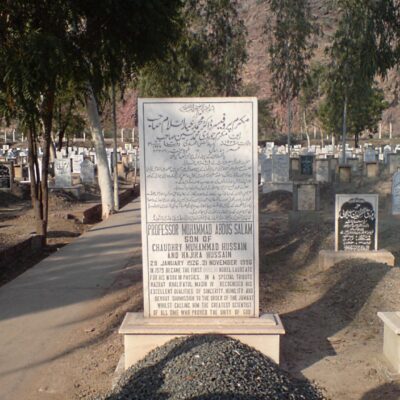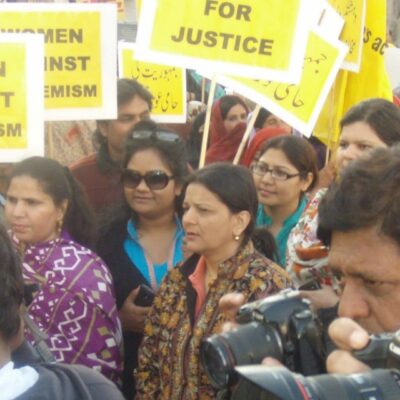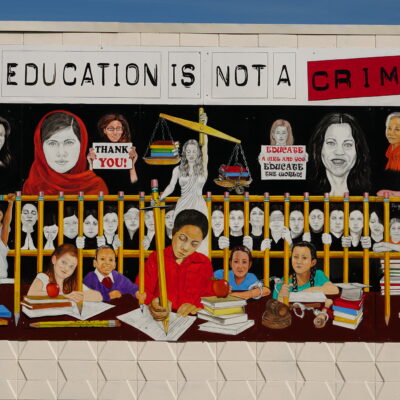There are competing ideas about the relationship between state and religion in Pakistan. These debates are often framed as secular versus religious. Yet in an overwhelmingly religious country, it is internal debates surrounding political Islam that can tell us the most about how the country works. This internal complexity coalesces around two historical figures of Muslim South Asia—Muhammad Iqbal (d.1938) and Abul Ala Maududi (d.1979). What makes them distinct and ideologically important is their insistence on the public political role of Islam. Contrary to dominant European traditions of thought that advocate the relegation of religion to the private sphere, Iqbal and Maududi represent differing affirming approaches to the role of religious politics in public life.
Today, a good example of how these two currents intersect and diverge is the politics of now-former Prime Minister Imran Khan and his PTI (Movement for Justice party). In presenting his ideas, Khan draws on both Iqbal and Maududi. Understanding the tensions of this synthesis can help us understand not only politics in Pakistan, but political Islam as a phenomenon more broadly.
Muhammad Iqbal was a celebrated spiritual poet, philosopher, politician, academic and barrister. He completed his initial education in the Lahore, British India, before studying in Cambridge and eventually receiving a PhD from the University of Munich. A man of wide education and travels, Iqbal was conversant with the intricacies of Islamic as well as European intellectual and philosophical thinking. His contentions are infused with a very strong sense of religiosity and spirituality, and he articulated his own comprehensive system of thought.
Iqbal sought a creative synthesis of the best of what he saw in Europe, with the essence of what he thought Islam had to offer. For Iqbal, Islamic monotheism ‘…as a working idea was equality, solidarity and freedom … spiritual democracy is the ultimate aim of Islam’. Iqbal’s political and ideological thought formed the genesis of the Pakistan Movement, the struggle to establish a nation-state for many Subcontinental Muslims. What eventually emerged, a Western-style parliamentary republic with an Islamic orientation, bears much of Iqbal’s imprint. Some commentators see the political intentions of the founding father of Pakistan, Muhammad Ali Jinnah (d.Karachi, 1948), as secular, but a more holistic reading of Jinnah’s frequent references to Islamic values would acknowledge the heavy debt to Iqbal.
Imran Khan, an Oxford graduate with a late-blooming interest in Islamic spirituality, comes out of this Iqbalian Islamic modernist tradition. Writing in the last chapter of his autobiography, Khan says ‘[Iqbal’s] … writings constantly inspire me’ and that ‘Pakistan must turn to Iqbal’s writings to reconstruct its intellectual and ethical foundation.’
The second figure of import is Abul Ala Maududi (d.1979). Maududi was a journalist, activist, scholar, political theorist and politician. Much like Iqbal, Maududi was interested in establishing the central role of Islamic beliefs in politics and society—developing the idea of, and writing on, the importance of establishing a ‘theo-democracy’. In the words of Professor Humeira Iqtidar, this ‘was a democracy to the extent that it supported limited popular will for rational decision making, but also produced epistemic humility by recognizing conceptually and practically that shariʿa, not unbounded human will, provided the overarching moral framework for this state.’ Assailing worldviews such as communism and liberalism, Maududi had a far more combative attitude towards the West. Maududi eventually laid his claim to history by founding the Jamaat-e-Islaami (JI), a political party dedicated to his cause that has exerted considerable influence on Pakistan’s direction. Unlike Iqbal however, Maududi sought to articulate an Islamic politics that was exclusivist in nature. For example, Maududi and his JI gained great traction as part of a campaign to have the state declare a heterodox Muslim group, the Ahmadiyya, as non-Muslims. The success of this campaign and other developments played a role in pushing Pakistani society and politics in a more exclusivist direction.
Maududi’s particular understanding of religion and state has, in so many ways, become the default mode of conceptualising Islamic politics. Much of this has to do with the Pakistani state’s embrace of Maududi’s ideas in the 1980s, partly as a way for then military dictator Zia-ul Haq (d.1988) to shore up needed legitimacy. In Pakistani society, terms like ‘the Islamic system of life’ and ‘Islaami Riasat’ [Islamic state] have left the exclusive ideological purview of the JI and entered the realm of common consciousness, employed and deployed by those interested in a more religiously orientated public sphere, and by those who aren’t. A practical manifestation of Maududi’s influence has been the trajectory of a constitutionally-sanctioned body, the Council of Islamic Ideology (CIC). Set up in the 1960s, the body is charged with providing the government with legal advice and recommendations on the perceived compatibility of laws with Islamic teaching and rulings. The CIC has been a source of much controversy and has essentially become a vessel for whichever manifestation of political Islam is dominant in the country at a particular time. For example, the 1980s saw the CIC at the forefront of Maudian-influenced legalistic understandings of Islam, and subsequent alterations to law.
Khan’s politics exists in a milieu where Maududi’s ideas and framing has immense saturation. This is how we can appreciate that despite Khan’s self-expressed ideological leaning towards Iqbal, critics often frame his politics in terms of a shallow religious populism. We can understand this in one way by seeing Khan’s appropriation of Maududian messaging as a practical move in an arena where the latter’s ideas have become so influential. This is perhaps one explanation for Khan’s ambivalent dealings with far-right Islamist groups like the anti-blasphemy TLP party, which despite their confrontational political tactics, have tapped into a widespread public sentiment. Khan’s government alternated between banning and engaging with the party, marginalising parts of the TLP agenda whilst simultaneously appropriating other portions of it. This manifested itself in one way with Khan’s creation of a largely symbolic ideological institution, the Rehmatul lil Alameen Authority (meaning ‘Mercy to the World’s’, which is a reference to a title of the Prophet Muhammad). This government body, tasked with the propagation of Islamic education and inspiring academic research on Islam, can be seen as an attempt to out-flank far-right conservatives in a struggle for religious legitimacy.
What we see in Iqbal and Maududi are two competing methodologies advocating for the importance of religion in public life. Their differences are most obvious in the way ideas are expressed. Iqbal’s ‘spiritual democracy’ is an altogether different entity from Maududi’s ‘theo-democracy’. Iqbal presented a sort of Islamic humanism centred around values and ethics, with human creativity as a driving force. Iqbal’s ideas about Islamic politics stressed the importance of freedom and dignity; for example he writes that, ‘in an over-organised society the individual is altogether crushed out of existence … the state is only an effort to realise the spiritual’.
Maududi however stressed the realisation of a Nizam-e-Zindagi [system/scheme of life], filtered primarily via an extensive lexicon of discipline, command and submission—Islam as a Nizam-e-A’taat o Bandagi, a system of obedience and dependence. In terms of state, Maududi envisions one that is ‘…universal and all-embracing. Its sphere of activity is coextensive with the whole of human life. It seeks to mould every aspect of life and activity in consonance with its moral norms and programme of social reform. In such a state no one can regard any field of his affairs as personal and private…’. Elsewhere, Maududi quotes approvingly, ‘if people deviate from guidance, they should be corrected by the sword (state power).’
The question of why Iqbal and Maududi differ in their approaches is a complex one. One reason is related to their differing intellectual responses to the pressures of modernity. In the political and epistemic sense, Iqbal saw the way ahead in a creative synthesis, whereas Maududi constantly sought to erect a politics of authenticity based on a supposed replication of the past. In responding to the outrage of colonial rule, Iqbal stressed a positive, self-confident worldview, preaching values of creativity, self-esteem and confidence. Maududi wrote far more explicitly from a place of fear, loss and preservation. What is fascinating is that both figures, whilst sharing some key characteristics, responded quite differently to the same set of historical circumstances. Some may credit the acceptance/rejection of Western influence as a key reason for the difference, but it also bears paying attention to Iqbal’s embrace of a worldview tied to Sufism. Sufism itself is a complex and multi-form phenomenon, but Iqbal’s activist embrace and political reinterpretation of Sufi values is significant and original. For example, his idea of the relationship between humans and God, which has implications for the relationship between religion and state, was rooted in Sufi precepts of love, devotion and service. Maududi on the other hand, explicitly rejected his own Sufi heritage. The more individualistic, intimate, and egalitarian framing of lover and beloved, a staple of Sufi discourse, were unsuitable for Maududi’s purposes. Theology inform politics. For Maududi, God is presented as a solely legislative, dominating entity with humans as a subordinated party. For Iqbal, God is represented as an empowerer, inviting humans to exercise their intellect, creativity and moral consciousness as His representatives on this earth, and in their journey upwards unto Him.
Khan stands somewhere in the middle of these two pillars of Islamic political thought. His tenure as Prime Minister was notable for his emphasis on Islamic ideas. A prime focus was his goal of creating a ‘Riasat-e-Medina’ (State of Medina). This is a powerful piece of rhetoric which claims to emulate the social-political values of the Prophet Muhammad in the present day. Consequently, Khan’s tenure can be characterised in one way as stressing ideas of justice, equity and anti-corruption, as well as a strong policy emphasis on social welfare schemes.
Whilst Khan’s ‘Riasat-e-Medina’ is taken from Maududi’s playbook, the Prime Minister’s political rhetoric didn’t include another key Islamist trope. In a recent public editorial, Khan waxes lyrical on his ideological and policy platform, but doesn’t mention ‘Sharia’ or ‘Sharia law’ at all. Whereas Maududi’s focus was legal, Khan takes these precepts on in a more abstract, value-based manner. It seems whereas Maududi sought to advance a supposed systematic alternative to the existing parliamentary order, Khan’s emphasis is more on reform of the existing system, which he contends needs honest leadership and some adjustment. Khan also differs from Maudadi in his attitude to civilisational difference. Maududi held the West in disdain and constantly stressed the differences and incompatibilities between Islam and Western concepts and ideals. Khan on the other hand, whilst invested in shaping a self-consciously Islamic identity amongst Pakistanis, never hesitates to acknowledge the positives of Western political institutions, hailing the West’s transparency and legal systems, and proclaiming Scandinavian welfare states to be the closest modern synonym of the ‘Riasat-e-Medina’. Khan’s political discourse has also gained traction amongst local and diaspora Pakistanis as a result of the post-9/11 rise in Islamophobia. Highlighting Islamophobia on the world stage was one of his signature policy measures, with several high-profile speeches and actions eventually resulting in a recent UN declaration of March 15th as the ‘International Day to Combat Islamophobia’. Khan has further leveraged this post-9/11 environment to popularise discussion of his own value-based understanding of political Islam, for example frequently invoking the lives and values of prominent historical Sufi saints in the Subcontinent.
In studying the tensions and vicissitudes of Imran Khan’s politics, we can learn much about the intellectual currents of political Islam in Pakistan. Ultimately, understanding this complexity—the push-and-pull between a more inclusionary, cosmopolitan political Islam as espoused by Iqbal, and its more exclusionary counterpart as espoused by Maududi—is crucial for better analysis and cross-cultural engagement going into the future.
Image: Imran Khan in Berlin, 2009. Credit: Heinrich-Böll-Stiftung/Flickr.




